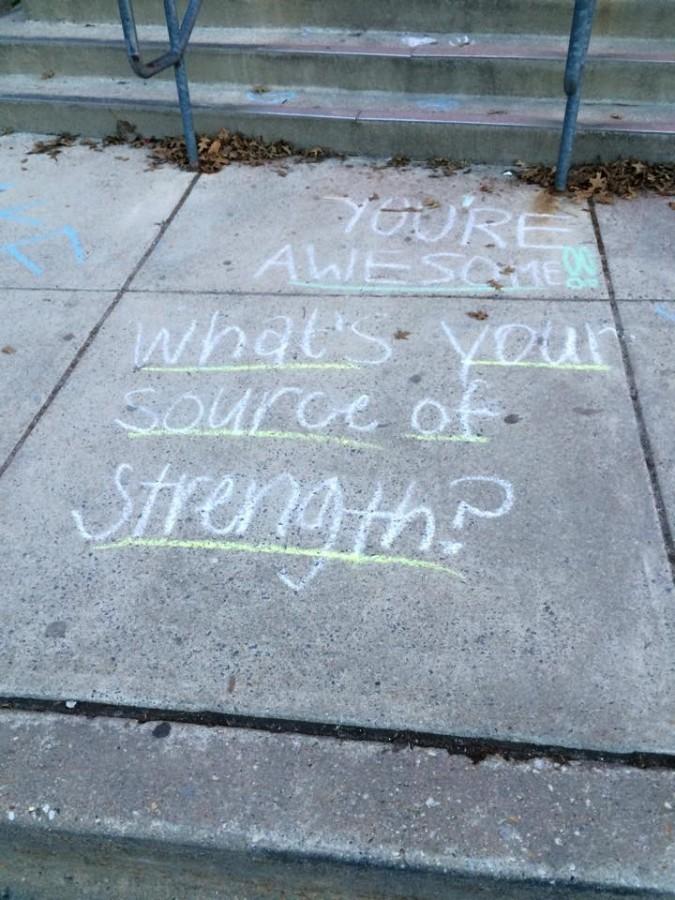SOS asks, ‘What are your sources of strength?’
SOS peer leaders, led by social studies teacher Jamie Frank, wrote positive messages outside the school to inspire students. The eight sources of strength refer to family support, generosity, healthy activities, medical access, mental health, mentors, positive friends and spirituality.
April 28, 2015
When CHS formed its own branch of the national suicide prevention project, Sources of Strength (SOS), its schoolwide founders never anticipated the success it would be within its first few months.
By instilling a positive atmosphere into CHS, SOS has created a platform for students to increase their awareness of depression and express their feelings to people who care.
“I am really happy the program started because it shows the student body that there are people that care all around you,” sophomore Nadia Narnor said.
The National Honor Society (NHS) and SOS held a dodgeball tournament April 1 and 2 to bring the school community closer and to fundraise for NHS. The tournament provided students and faculty with a fun, new way of raising money and competing with each other in a friendly manner.
“The dodgeball tournament was planned with NHS because SOS is part of their effort this year to raise awareness of mental illnesses,” junior SOS member Emma Margolis said.
The SOS program at CHS works in partnership with the National Honor Society (NHS) and focuses on finding everyone’s source of strength. It attempts to create a sense of community at CHS and make everyone feel valued.
“The simplest action can lighten up someone’s day, all because of a little extra positivity,” junior SOS member Anthony Ratinov said.
One way the club spreads positivity is through the use of chalk. Members of the club wrote positive messages such as “You rock!” and “Be happy!” in colorful chalk on sidewalks around CHS in order to lift spirits and enhance a positive environment.
“The chalk was a suggestion from the national SOS leaders as a quick and easy way to spread positive messages and get the word out [about SOS],” senior NHS president Lucy Srour said.
Every SOS member is trained to be a positive role model in the community and to handle situations involving suicide or depression with maturity and in an effective manner. Initially, each member was selected by teachers based on his or her leadership qualities and then put through training to ensure that SOS had the best possible peer leaders.
“The goal is to have around ten percent of the student body as peer leaders,” Srour said.
Students in SOS are dedicated to spreading awareness for mental illness and depression and promoting the three core values of hope, help and strength.
According to founder and social studies teacher Jamie Frank, SOS was brought to CHS through the Parent Teacher Student Association (PTSA) President Robyn Solomon and Principal Joan Benz after attending an event that was sponsoring the program. They submitted a request to be part of a National Alliance on Mental Illness (NAMI) grant bringing SOS to schools in MCPS, and were approved for the grant in January.
As SOS expands locally and becomes more integrated into CHS, its members hope to continue to eliminate suicide and stress as much as possible. To do so, the program has big plans for the future.
“The club plans to keep spreading positive words and doing fun activities,” sophomore SOS member Bettina Papageorge said. “Our social media accounts help spread the word [and keep everyone updated].”
Although the program is still relatively new, it has already made an impact on the student body.
“I am seeing a whole new side of people, how caring and generous and friendly so many of my classmates are,” Srour said. “That is why SOS will work so well at Churchill because of this incredible student body.”
As the program grows and spreads awareness for its cause, it is hoped that these trends continue.
“In building on everyone’s strengths, we hope to strengthen the resiliency of our students and our community so we can eradicate bullying, alcohol and drug abuse, and never again experience the tragedy of someone feeling so isolated and alone that they have to take their own life,” NHS
Frank said.



HuxTheHunk • Apr 19, 2017 at 12:48 pm
Nathan is my source of strength.